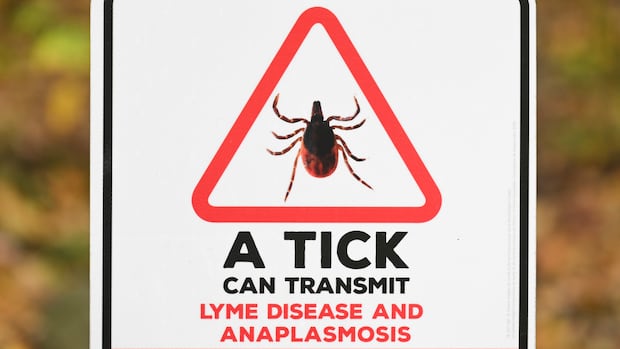Nova Scotia·NewAn Nova Scotia woman who has had two bouts of Lyme disease says it can be difficult to spot — even if you have previous experience with it.Karn Nichols of Hubley said the disease can be difficult to spotAnjuli Patil · CBC News · Posted: Nov 16, 2025 5:00 AM EST | Last Updated: 30 minutes agoListen to this articleEstimated 4 minutesThe audio version of this article is generated by text-to-speech, a technology based on artificial intelligence.A sign advises hikers of ticks in the woods in the Eastern Townships west of Montreal in 2024. (The Canadian Press)A Hubley, N.S., woman says Lyme disease can be difficult to spot, even if you’ve had previous experience with it.Karn Nichols is recovering from her second bout with Lyme disease. Her first was four years ago.This time, she didn’t have the exact telltale sign of a tick bite — a rash shaped like a bullseye. “I knew something was up, I didn’t know quite what,” Nichols told CBC’s Information Morning Nova Scotia in an interview that aired on Friday.She said she is still recovering from Lyme disease after she first noticed a rash on her leg this summer.Nichols had been at her cottage in Annapolis County at the end of July when she noticed the rash. She also had a lymph node infection.”So I thought I’m probably going to go down the same path again,” she said. “I should get it looked at as soon as possible.”Nichols went to a pharmacy after seeing ads that they could help with the antibiotics for Lyme disease. But she wasn’t able to get help there.Lyme testing”I showed them the rash and because it didn’t present as a bullseye and I didn’t have the tick itself, they were unable to do anything about it,” Nichols said.From there, Nichols said she was able to get an appointment with her doctor. She said he was reluctant to prescribe her the antibiotic, but got her a blood test for Lyme. She said the test came back negative two weeks later.”At that time, I took it at face value because I still had the rash, but I hadn’t received any sort of symptoms that were really concerning for me,” she said.Blacklegged ticks, also known as deer ticks, are the mostly likely tick species to carry Lyme disease. (Submitted by Vett Lloyd)Dr. Glenn Patriquin, co-director of bacteriology at the QEII diagnostic microbiology lab, told Information Morning a diagnostic test for Lyme disease has a window.”What that means is that someone may actually have the infection, but has not developed any sign that would show up as a positive test,” he said. “And the window may vary based on the test and the infection.”Bullseye rashPatriquin said if someone thinks they’ve had exposure to a blacklegged tick that transmits Lyme, they should seek medical attention and be assessed for the bullseye rash. But he notes the bullseye is a bit of a misnomer because it doesn’t always look like one.”There might be a round rash with clearing in the centre or no clearing in the centre,” he said. “So, that can be assessed by a health-care professional to see if there’s any signs of local Lyme disease.”Patriquin said if a patient has a negative test, they should ask for a second test if their symptoms persist.Perpetual headacheNichols’s health took a bad turn in subsequent weeks following the negative test results. She said she had a headache that wouldn’t go away.”It was like someone sort of sticking knives behind my eyes. And then it radiated down my back and it just didn’t go away. I couldn’t sleep,” she said.Eventually, she ended up in the hospital. Another test for Lyme came back positive. It took three months from the rash to get that positive test back, she said.”I think the toughest part is when you go home and expect yourself to be normal again and you’re not,” Nichols said.Nichols is encouraging everyone to be diligent when it comes to checking for ticks.Advocating for yourselfPatriquin said he couldn’t comment on Nichols’s case, but said it’s always possible to get a second Lyme test if the first comes back negative.”Advocate for that second test if you think you were tested too early or not tested and enough time has passed where you may have developed antibodies,” he said.MORE TOP STORIESABOUT THE AUTHORAnjuli Patil is a reporter with CBC Nova Scotia’s digital team.With files from Information Morning
N.S. woman highlights barriers in getting help for Lyme disease











